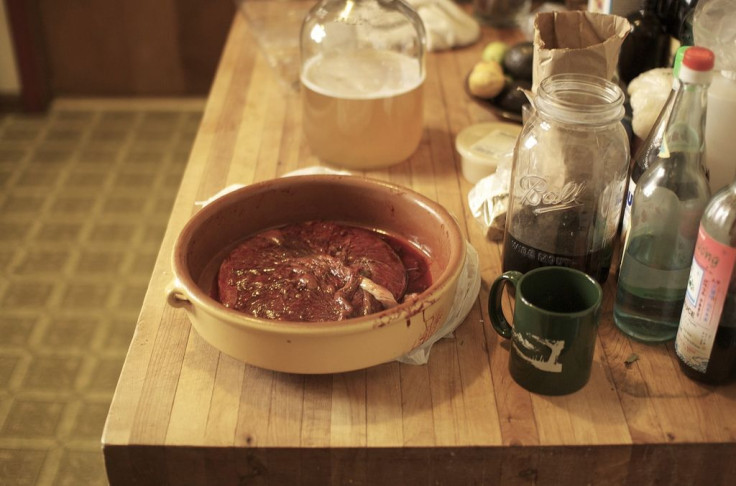Eating Placenta Post-Delivery Unfounded As Way To Improve Energy And Nutrition

Even as an organic, natural, and free-range foodstuff, placenta’s health benefits are anyone’s guess, say scientists at Northwestern University.
The moms in favor of the practice say eating placenta delivers energy-boosting iron, stimulates lactation, and, the (ahem) mother of all benefits, relieves post-partum depression. But even as the practice is touted by many a celebrity mom, such as January Jones and Kourtney Kardashian, the nutritional value of eating your own afterbirth, whether pan-fried or blended in a smoothie, has yet to leave the realm of anecdotal evidence. Scientists, like parents, just don’t understand.
“There are a lot of subjective reports from women who perceived benefits, but there hasn't been any systematic research investigating the benefits or the risk of placenta ingestion,” said Dr. Crystal Clark, co-author of a recent systematic review on placenta eating, in a statement.
Clark and her colleagues scanned the scientific literature for evidence that might uphold what the Joneses and Kardashians of the world have been recommending. They looked at “placentophagy” at large — that is, the consumption of placenta — whether it is ingested as a pill, a route which Kardashian has embraced, or processed in some other way as part of a meal. Their search turned up dry. No clear-cut benefits emerged. But some consequences may have.
“Our sense is that women choosing placentophagy, who may otherwise be very careful about what they are putting into their bodies during pregnancy and nursing, are willing to ingest something without evidence of its benefits and, more importantly, of its potential risks to themselves and their nursing infants,” said co-author Dr. Cynthia Coyle, psychologist at Northwestern’s School of Medicine, in the press release.
Foods distributed in boxes and bags, even loose vegetables and seafood, must all pass some form quality control. They’re checked for things like defective packaging, harmful ingredients, and any exposure to dangerous contaminants. Homemade dishes involving placenta rely on no such regulatory system, neither in how the placenta is stored nor in how it ultimately gets prepared. Obviously women know where it came from, but as Coyle points out, they “really don't know what they are ingesting.”
Swapping Unknown Risks
Some women use a naturalistic approach to arguing in favor of spaghetti with placenta-infused meat sauce or a plate of raw placenta simply seasoned. They point to virtually all other mammals, even the trusty family dog, who are unafraid and actually embrace eating the placenta. To which scientists coolly retort: Look at what else your dog eats.
Owing to celebrities’ public influence, however, a lack of data has done little to reduce the practice’s staying power. The truth is, people have been eating placenta since the 1960s, when back-to-nature folk decided the best stuff on earth actually came from inside our own bodies. Maybe.
One of the questions science is trying to answer is how much damage placentas can actually do. While they help to nourish the developing fetus, they can also bring in outside pollutants. And what little data there is to suggest any supposed health benefits is tinged with political bias. In 2013, a study found a significant portion of women said they felt genuine boosts to their mood and energy from eating their placenta, and said they’d do it again, too, but the person doing the research runs a service that turns placenta in digestible capsules.
According to Coyle, the current research is hoping to unearth some of the mechanisms driving placentophagy. Celebrity endorsements certainly seem like a worthy explanation, though scientists are curious whether health care providers, both nationally and internationally, are recommending the practice to patients. Even though women might fear the unknown risks of post-partum depression medication, Coyle wants to emphasize that eating a placenta isn’t necessarily an improvement.
“[For] women who are very conscientious about what they put in their body during pregnancy and nursing and who maybe would avoid raw fish or certain cheeses or whatever else,” Coyle told The Atlantic, “before making this decision just be aware that it’s still unknown what’s being consumed.”
Source: Clark C, et al. Archives of Women's Mental Health. 2015.



























